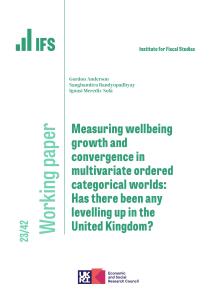I hesitate to dive into the discussion about levelling up. I have no answers. Nor, really, does anyone else, least of all the prime minister, who certainly provided none in last week’s much trailed but ultimately empty speech. Then again, he’s in good company. This ambition to level up is not a new one, after all. Efforts to reduce the UK’s spatial disparities date back at least as far as the 1934 Special Areas Act. Disparities between the regions of the UK are longstanding and in some dimensions, at least, haven’t actually changed that much in decades.
So what is the problem, what might we do about it and how will we know when we have succeeded?
You might think the answer to the first question was obvious: some bits of the country, London, the southeast, are much better off than other bits, the Midlands and the north. Not, actually, if you look at people’s disposable incomes. Once you take account of housing costs, the median disposable income in London is no higher than the national average. Other things are very different though. There are big differences in productivity. Wages are higher in London. According to Professor Henry Overman of the London School of Economics, that’s mostly because of where the most highly educated and highly skilled live and work, rather than because there is a big difference between what similarly skilled people can earn in different parts of the country. There are far more graduates in London than there are in the north.
One very big difference is that the very rich, both the wealthiest and the highest earners, are concentrated in London and the southeast. The poor are not just always with us, they are everywhere — just as numerous in London as elsewhere.
The problem, economically speaking, is that good, highly skilled, well-paid jobs are not evenly spread across the country. Poorer regions lose too many of their best-educated young people because they don’t have attractive jobs to go to. It’s difficult to locate high-skilled jobs in regions with few high-skilled workers. You see the problem.
The term “good jobs” is an important one. We are not the only ones to worry about these things. It has probably escaped your notice that in France, a commission of eminent economists, led by the Nobel laureate Jean Tirole and the former International Monetary Fund chief economist Olivier Blanchard, has just completed a report ordered by President Macron. It looks at three major economic challenges: climate change, demographic change, and inequality. Hard to imagine prime minister Johnson commissioning something similar.
They worry about inequalities there too, even though income inequality is a lot lower than it is here, in part down to a much more generous benefit system. Their evidence about what their compatriots are actually concerned about — a good place to start, by the way — is that unequal incomes per se are not the problem. Unequal opportunities and in particular opportunities to get a “good job” are what matter. The French, and I rather suspect the British, consider a good job to be one that “provides them with a reasonably long tenure within the firm, pay progression and good benefits, responsibilities, opportunities for promotion and a decent working environment. A good working life is one in which, in addition, if a good job is terminated, one can get another good job.” The problem is that inadequate education and training, alongside changing technology and trade patterns, have led to a hollowing out of traditional skilled and middle-class jobs, especially in peripheral regions.
Easy to say, hard to address. But it rings true. Ed Miliband might have said we need pre-distribution. Others might call for an industrial strategy. Perhaps the biggest economic challenge facing us is finding ways to manage the effects of trade and technological change such that they support rather than undermine good jobs. One thing is for sure. Redistributing income through higher benefits may be necessary, it may reduce income inequality, but it will not reduce these inequalities that people really seem to care about.
The prime minister quoted Andy Haldane, former chief economist at the Bank of England, approvingly for saying that our economy “is poised to recover like a coiled spring”. That hasn’t stopped him disbanding the industrial strategy council, of which Haldane was chairman. Johnson, though, may be in agreement with its view that “sustained local growth needs to be rooted in local strategies, covering not only infrastructure but skills, sectors, education and culture”. You can’t level up from the centre. If there was any content to his speech, it was his nod to the need for more elected mayors and some more devolution of power from the centre.
How will we know if we are making progress? The obvious thing to look at will be the distribution of wages, skilled jobs and skilled workers across the country. There is one even more fundamental difference between us, though, the narrowing of which I would take as real and incontrovertible evidence of success. Johnson expressed outrage that “a man in Glasgow or Blackpool has an average of ten years less on this planet than someone growing up in Hart in Hampshire or in Rutland”. Why, he asked, “do the people of Rutland live to such prodigious ages?”
We know the answer to that. People who are better off, and have happier, more fulfilling lives and good jobs, live longer and healthier lives than those who don’t. That’s the clear conclusion of decades of work on health inequalities.
We’ll know we are on the way to levelling up when differences in health and life expectancy across the country start to drop. Sadly, that’s one measure of inequality that has clearly been moving in the wrong direction over the past decade.
This article was first published in The Times and is reproduced here with kind permission.








